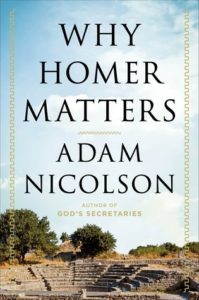 Our son, a teacher of English and a sailor, recommended this new study of the Homeric poems, the Iliad and the Odyssey. I had read them in the Robert Fagles translations, the first in 1996, the second a year later. Nicolson’s learned and lyrical commentary brings these 4,000-year-old stories into a fresh perspective of how memory, epic and history are important to us.
Our son, a teacher of English and a sailor, recommended this new study of the Homeric poems, the Iliad and the Odyssey. I had read them in the Robert Fagles translations, the first in 1996, the second a year later. Nicolson’s learned and lyrical commentary brings these 4,000-year-old stories into a fresh perspective of how memory, epic and history are important to us.
He argues that Homer “makes the distant past as immediate to us as our own lives.” In addition, the author is an accomplished sailor, adding to his understanding of Odysseus’s peregrinations throughout the Mediterranean.
These poems present a “plunging perspective into the ancient,” seeking “a form of reassurance that in the end there is some kind of understanding in the world … a braided stream of possibilities pouring into the present out of the past.” Nicolson adds, “no place for Homer is more filled with tragedy than the beach, ”a point of transition for the Greeks transforming themselves from a land-based horde to sea-faring seekers.”
But who was Homer?
Nicolson suggests, “there was no human being called Homer; his words are the descendants of memory and power, the offspring of the muse who had a beautiful voice.” Stories were created, then passed along from generation to generation through memory and song, always modified to fit more current conditions.
“Homer was an ancient inheritance in the eighth century BC … already a thousand years old … The Homeric poems, or at least versions of them, were written down … perhaps about 725 BC, or maybe as much as a century later.” And even then successive scribes often altered the written versions. “Homer is haunted by the threat of transience, by the way memory fails and meanings drift in the face of time.”
To Nicolson the Iliad is “ … a tapestry of sorrow, in which the noncity is set against the city, where the marginal and contingent confront the settled and the secure … the loved against the abused, the creative against the destructive forces of life.” And, yes, even today!
The Greeks attacking Troy were northerners, Indo-Europeans, “their roots in the steppelands of Eurasia … semi-nomadic pastoralists” exhibiting “the hero complex: maleness, heroic individuality and dominance.” Their theme: “… we are all vagabonds on earth, nothing belongs to us, our lives have no consequence and our possessions are dross. We are wanderers, place shifters, the cosmic homeless.” The settled, affluent, and wealthy Trojans didn’t have a chance.
Much of this recurs in the Odyssey: “the heart of the poem is this contingency, the absence of any over-riding permanence,” the continuous search for meaning..
Nicolson’s frequent allusions to sailing are almost elegiac. Here is one about the Odyssey: “They won’t be wrecked on the illusions of nostalgia, the longing for that heroized, antique world, because . . . to live well in the world, nostalgia must be resisted; you must stay with your ship, stay tied to the present, remain mobile, keep adjusting the rig, work with the swells, watch for the wind-shift, watch as the boom swings over, engage, in other words, with the muddle and duplicity and difficulty of life. Don’t be tempted into the lovely simplicities that the heroic past seems to offer.”
Solid counsel for some of our politicians today!
While the Homeric poems illustrate the horrific mores of some 4000 years ago, “ . . . the usefulness of violence, the lack of regret at killing, the subjection and selling of women, the extinction of all men in a surrendering city or the sense that justice resides in personal revenge,” “what is valuable and essential in these poems is the opposite of that: the ability to regard all aspects of life with clarity, equanimity and sympathy, with a loving heart and an unclouded eye.”
Homer “provides no answers, ”… but simply illustrates, “the complexity of life, the bubbling vitality of a boat at sea, the resurgent energy, as he repeatedly says, of the bright wake starting to gleam behind you.”
To conclude: “So now, each time the wind fills in, and you roll your headsails out and get the main up, and you feel the boat starting to gather way, to pick up its skirts, unable to resist the pull of the wind, you will know something essential of the Homeric world. Here under the bow you can listen, like the Phaeacians carrying Odysseus home, to the water surge and fall, that repeated hoosssh-hoosssh of a hull at speed.
And here, as you make your way between the blue islands, the boat heeled far over and the curves of the headsails bellied out to leeward, you can begin to know and sense the power of possibility in the well-balanced, well-benched ship, equipped with all it needs, acquiring the world, stretching the idea of what it means to be alive, leading men to adventure, home or war.”
Isn’t it time to read Nicolson and reread the Iliad and the Odyssey?
Editor’s Note: ‘Why Homer Matters’ by Adam Nicolson was published by Henry Holt & Co., New York 2014.